Why 780 retired generals and former national security leaders spoke out against Trump
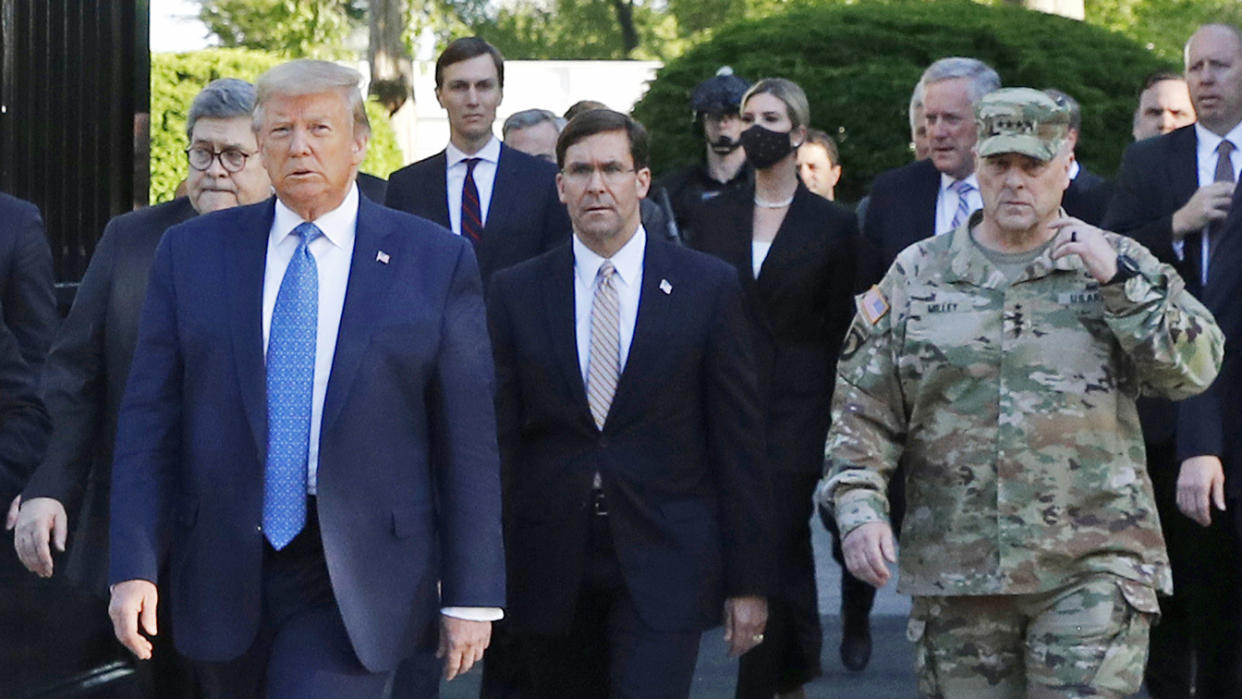
On June 1, retired Army Vice Chief of Staff Gen. Peter Chiarelli sat staring out at the Pacific Ocean in Gearhart, Ore., where his family had vacationed throughout his long military career. The peaceful scene was occasionally interrupted by the news flashing across the notebook computer in his lap. In a Rose Garden speech that afternoon, President Trump addressed the racial justice protests spreading across the nation after the brutal killing of George Floyd in police custody a week earlier.
In the speech, Trump proclaimed himself “your president of law and order,” and claimed the protests had been hijacked by “professional anarchists, violent mobs, arsonists, looters, criminals, rider rioters, antifa and others” intent on “domestic terror.” News cameras showed some of the hundreds of National Guard troops from around the country that had been sent to reinforce the D.C. Guard, and there were reports that 1,600 active-duty troops were on high alert just outside the capital. Privately, Trump was threatening to invoke the Insurrection Act in order to send thousands more active-duty troops onto the nation’s streets in a show of dominant military force, criticizing weak governors and mayors around the country for not doing more to forcefully stamp out the protests.
The television cameras shifted to a mostly peaceful crowd of protesters across Lafayette Park from the White House. Chiarelli sat up when a phalanx of federal police and National Guard troops suddenly marched into the peaceful crowd, backed by a small cavalry of Park Police on horseback. There were flash-bang explosions, clouds of tear gas and the crackle of pepper balls as riot police used shields and batons to pummel some in the crowd. A woman could be heard plaintively shouting above the din, “Why are you shooting at us?!”
After the crowd was dispersed, Chiarelli watched with growing alarm as the president strode purposefully across Lafayette Park flanked by Attorney General William Barr, Defense Secretary Mark Esper and Gen. Mark Milley, chairman of the Joint Chiefs of Staff. Chiarelli had served in combat with Milley in Iraq, and considered him a good friend. That Mark Milley would have known better than to appear at the president’s side in his camouflage uniform after a show of dominant force against protesters on the streets of America.
In front of historic St. John’s Church, damaged by fire during earlier protests, Trump posed silently holding a Bible aloft for a two-minute photo op. At long last, Trump had the image of the “American carnage” that he had promised to end in his inauguration speech, insisting that he alone could fix it.
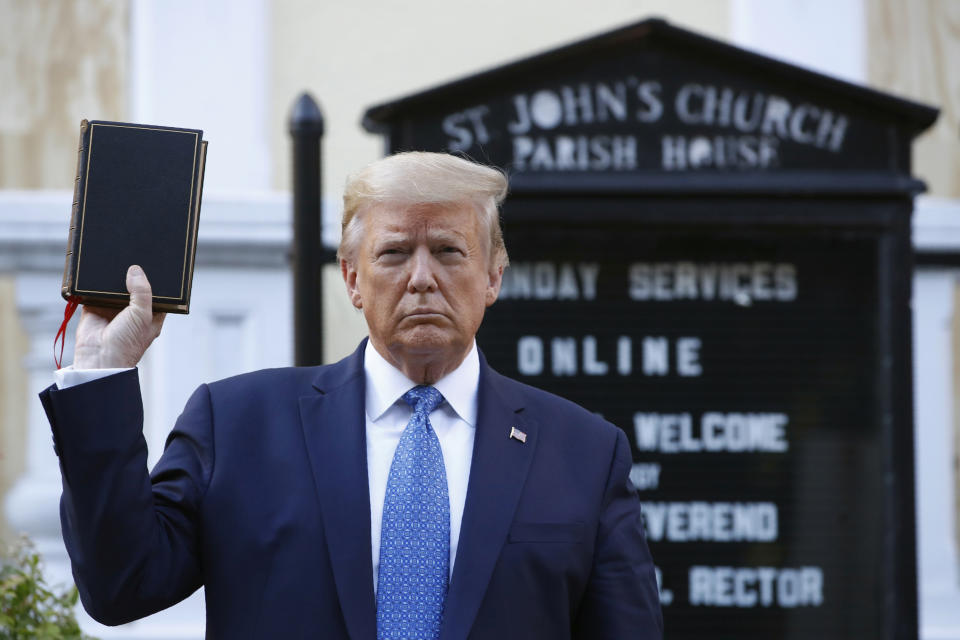
Along with a cadre of other retired generals, a very upset Peter Chiarelli decided to contact his old friend Milley, the most senior uniformed leader in the country. After serving as commander of the 147.000 U.S. and coalition troops of Multi-National Corps — Iraq, Chiarelli as vice chief of the Army had led Defense Department efforts to treat post-traumatic stress, traumatic brain injury and suicide prevention. On his retirement in 2012, he became the first CEO of One Mind, which supports research into brain illnesses and injuries.
“That whole incident around Lafayette Square was stunning to me, because those were mostly peaceful demonstrators exercising a right guaranteed by the Constitution that I’ve sworn allegiance to throughout my entire career,” said Chiarelli in an interview. That allegiance is not given to a political party, Congress or the president of the United States, he noted, making the image of a uniformed chairman of the Joint Chiefs and the defense secretary at Trump’s side that day so alarming. Milley later apologized for his presence in Lafayette Square, and Esper earned the president’s enmity by publicly opposing invocation of the Insurrection Act in order to use U.S. military troops to “dominate” the streets.
Along with more than 780 retired high-ranking officers and former national security leaders — including 22 retired four-star generals and admirals and five former secretaries of defense — Chiarelli signed an “Open Letter to America” endorsing Joe Biden for president. “We love our country,” the signatories wrote. “Unfortunately, we also fear for it.”
“Signing that letter was very hard for me to do, because I have never done that before or even given a dollar to a political campaign. Frankly, even as a retired general I didn’t think it was the right thing to do,” said Chiarelli, stressing that active-duty military officers are indoctrinated from a young age to remain strictly nonpartisan and apolitical. “But this president has assaulted the military justice system on behalf of individuals charged with war crimes. He has ended the career of service members like [impeachment witness Lt. Col. Alexander] Vindman for doing his duty and what was right. He has maligned mail-in voting as a fraud and suggested he might claim victory in a close election before all the ballots are counted, when as a service member I have voted absentee by mail my entire life. So like everyone else I’ve become numb after four years of this, but we have gone places in that time that I never dreamt we would go as a nation. I really do fear that the republic that I swore allegiance to is now under threat.”
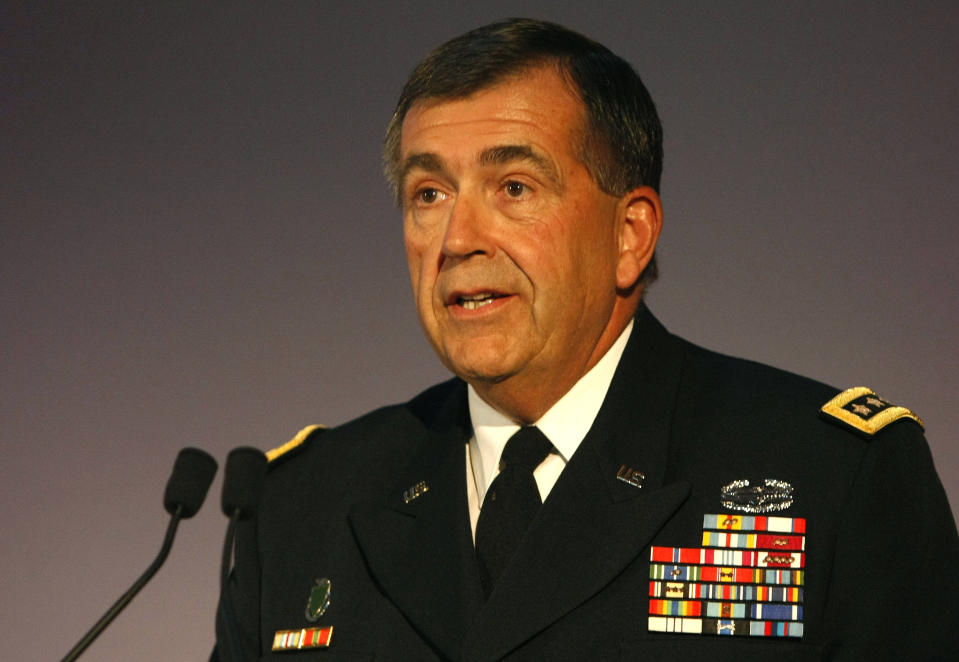
Even among the cascade of scandals and controversies that have characterized the Trump presidency, the use of excessive force against mostly peaceful protesters near Lafayette Square, and the involvement of the top ranks of the U.S. military, still stands out. The incident conjured a truly dystopian vision of a U.S. president not only willing but eager to use the world’s most powerful military to crush domestic protests and “dominate” the streets of America, one that an increasing number of retired generals and senior national security experts believe could become all too real in a second Trump term.
Lafayette Square was so alarming that it shook Trump’s former defense secretary, retired four-star Marine Gen. Jim Mattis, out of his long silence on the president’s leadership, writing afterwards that “Donald Trump is the first president in my lifetime who does not try to unite the American people — does not even pretend to try.”
Trump’s troubling authoritarian instincts, focus on image over substance, constant misuse and politicization of nonpartisan institutions and penchant for chaos were all on clear display in Lafayette Square, and the incident crystalized the concerns expressed in the open letter. Traditionally both active-duty and retired U.S. military and intelligence officials have steered clear of politics, but in mid-September the Trump campaign released a letter signed by 235 retired senior military officers endorsing the president for reelection with the claim that Americans’ "historic way of life is at stake" if the “socialists and Marxists” of the Democratic Party take control of the government.
The willingness of hundreds of career officers to break with tradition and speak out on behalf of one candidate reflects beliefs, on both sides, that the nation faces an uncertain future, facing the worst pandemic in over a century, the worst economic decline since the Great Depression and the worst racial unrest since the 1960s. To the signers of the “Open Letter to America,” a second Trump term would only make things worse.
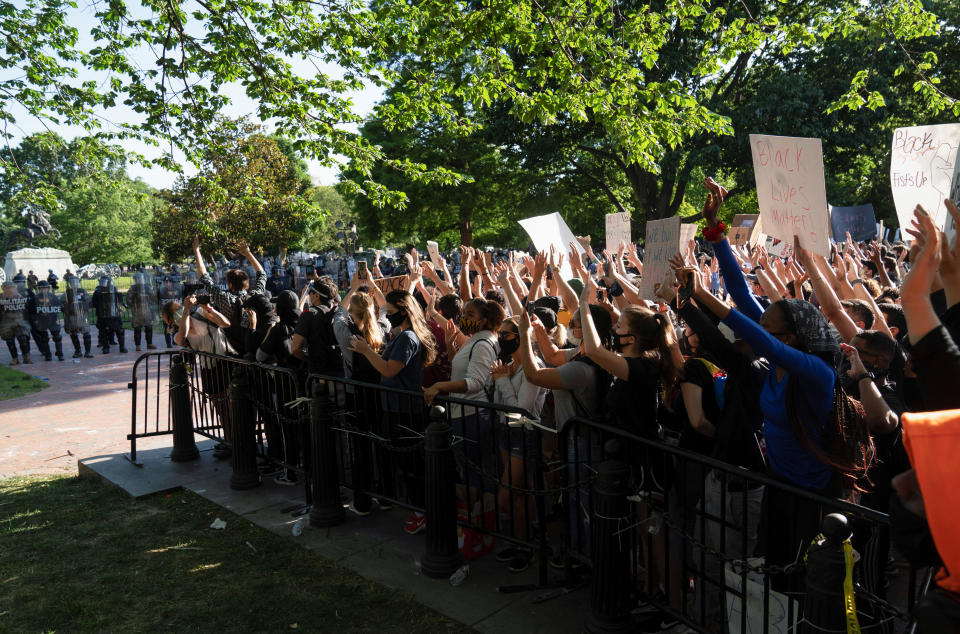
“Over the last three-plus years, I’ve watched the Trump administration politicize the Department of Justice and eviscerate the State Department, and the situation in Lafayette Square made clear that if reelected, Trump will politicize the Defense Department as well,” said retired Rear Adm. Mike Smith, who was instrumental in organizing the “Open Letter to America.” “A lot of us who spent our careers in the military would rather have stayed out of politics, but we have a deep moral conviction that the country can’t afford to go through another four years of this kind of leadership.”
Already the Lafayette Square incident has sunk beneath a wave of subsequent controversies and scandals, including recent revelations in investigative reporter Bob Woodward’s book “Rage,” based on numerous on-the-record interviews with Trump, that the president knew early on about the deadly and extremely contagious nature of the COVID-19 virus, but chose to continually play down the threat; the revelations in an article in the Atlantic, backed by reporting by the Washington Post, Fox News and other outlets, that Trump has repeatedly shown contempt for U.S. service members killed in combat, including referring to fallen soldiers and marines in cemeteries overseas as “losers” and “suckers”; Trump’s bullying and hectoring performance in the first presidential debate that astounded viewers at home and abroad; the president’s decision to put the health and lives of his Secret Service detail in jeopardy for a photo op after he tested positive for the coronavirus; and Trump’s insistence that the presidential election weeks away will be the “most rigged” in history, and his refusal to commit to accepting its results and peacefully transfer power if he loses.
Civil-military dysfunction
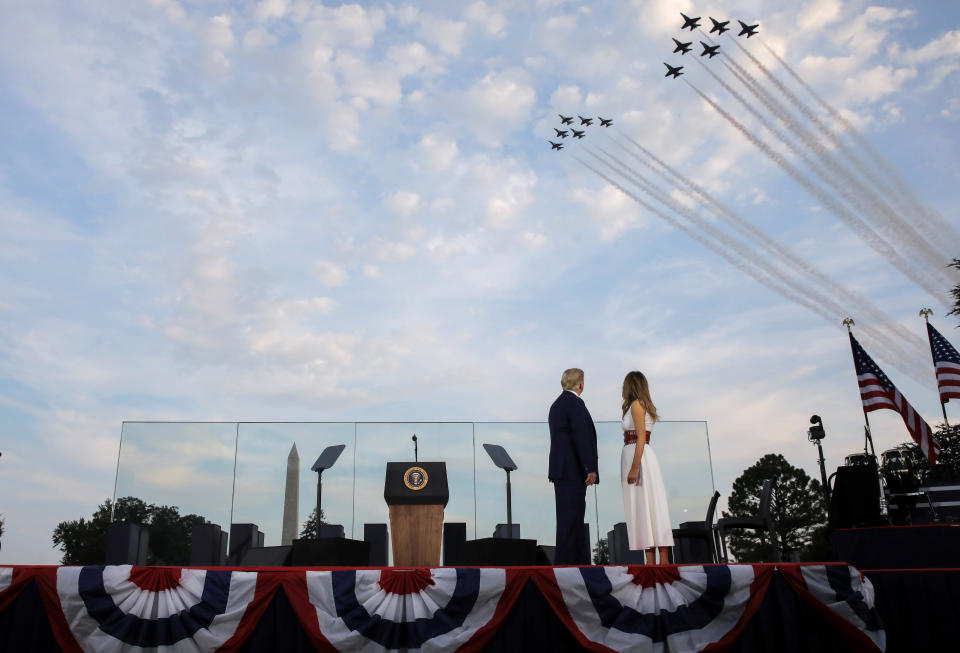
Trump’s relationship with military commanders might have been an asset in his reelection campaign. He has increased defense spending each year of his presidency, with the United States on track to spend more on the military in 2020 (adjusted for inflation) than at any point since World War II, with the exception of a few years at the height of the Iraq War. Early in his term, Trump pleased commanders by relaxing battlefield restrictions in the fight against the Islamic State, and he ordered successful strikes that killed ISIS leader Abu Bakr al-Baghdadi and Iranian Quds Force leader Qassem Soleimani.
As commander in chief, Trump also clearly revels in the pomp and spectacle of military parades, and in salutes to the troops. Yet from the early days of his presidency there were signs of severe tension between a president who has racked up an unprecedented 20,000 falsehoods since taking the oath, according to the Washington Post’s “Fact Checker,” and an institution built on the ethos that officers “will not lie, cheat, steal, or tolerate those who do.” There were also early indications that Trump was willing to politicize the most stringently apolitical institution in the U.S. government, treating appearances with the troops like political rallies where he excoriated Democrats and signed “Make America Great Again” hats. Before the 2018 midterm elections, Trump alarmed senior military leaders by sending active-duty troops to the southern border to confront a ragtag caravan of asylum seekers and migrants in a nakedly political stunt, and he diverted Pentagon funds to build sections of the wall he promised that Mexico would pay for.
From the beginning of his term, Trump has also exhibited indifference bordering on contempt for the sacrifices and principle of selfless service that underlies the military profession. Many officers were willing to look past the five draft deferments Trump received during the Vietnam War, including one for a “bone spur” diagnosis from a New York podiatrist who reportedly rented an apartment from Trump’s father.
More troubling to many uniformed leaders was Trump’s belittling of the Muslim Gold Star parents of a slain U.S. soldier who criticized him during the 2016 Democratic National Convention, and the president’s casual dismissal of the wartime service of the late Sen. John McCain, a former Navy pilot who spent more than five years being tormented in the notorious “Hanoi Hilton” prison. “He’s not a war hero,” said candidate Trump, when he was feuding with the Arizona senator. “He was a war hero because he was captured. I like people who weren’t captured.”
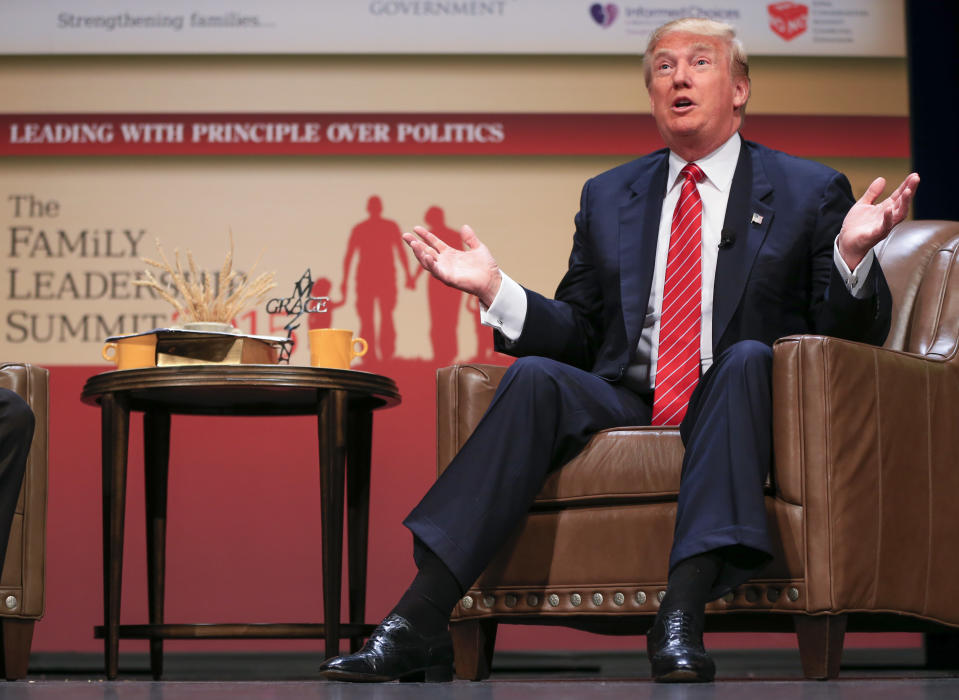
In his first briefing inside the Pentagon’s classified “tank” with then Defense Secretary Mattis and the Joint Chiefs, Trump famously bristled at their arguments supporting NATO and ongoing operations in Afghanistan. “You’re all losers,” Trump reportedly said to a room full of four-star flag officers and combat veterans. “You don’t know how to win anymore.” After Mattis later resigned to protest Trump’s rash decision to pull U.S. troops out of Syria and abandon Kurdish allies in the fight against ISIS, Trump publicly dissed him as “the world’s most overrated general.”
“President Trump routinely shows disrespect towards exemplary leaders like Senator McCain, and towards Gen. Jim Mattis, one of our very best,” said retired Marine Lt. Gen. Frank Libutti, a combat veteran and Purple Heart recipient who signed the “Open Letter to America.” “It recalls his public ridicule of many of his top military and intelligence community leaders, and his insistence that he knows more about issues of national security than they do, which is nonsense. But what I found truly shocking were Trump’s comments about the Marines who sacrificed their lives for victory at Belleau Wood. I believe words count. Character counts. Temperament counts. And President Trump has shown himself beneath the dignity of the office.”
A seeming contempt for military service came through most clearly when Trump canceled a planned visit to a World War I military cemetery near Paris because of rain during a 2018 trip. Quoting four anonymous sources with firsthand knowledge of the discussion that day, the Atlantic’s editor in chief Jeffrey Goldberg reported that Trump said, “Why should I go to that cemetery? It’s filled with losers.” In a separate conversation on the same trip, Trump reportedly referred to the more than 1,800 Marines who lost their lives at Belleau Wood as “suckers” for getting killed. Fox News and the Washington Post later confirmed similar episodes of the president denigrating military service.
Retired Air Force Gen. Charles Boyd spent more than six years as a prisoner of war in North Vietnam, and he is the only Vietnam War POW to later reach four-star rank. “When I read the Atlantic article, I found it absolutely disgusting. The idea that the commander in chief holds those who serve under him with such contempt, just because they are not driven by the same desire for money and wealth as him, made me sick to my stomach. In all of my experiences in life, I’ve never known any group that is more honorable than military professionals, who sign an unlimited liability contract to sacrifice their lives if called to for this nation.”
In the past, Boyd has also opposed even retired flag officers endorsing candidates or becoming involved in partisan politics, but he made an exception this year by signing the “Open Letter to America.” “There’s a saying in the military that ‘officers eat last,’ which means that leadership is all about what’s best for your troops, and for the nation. President Trump has no concept of that kind of leadership. Everything he does is driven by what’s best for him personally, including casting doubt on any election results that don’t declare him the winner. That’s destructive to the very fiber of our democracy.”
_____
Read more from Yahoo News:


